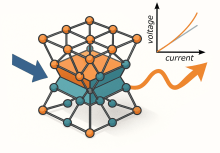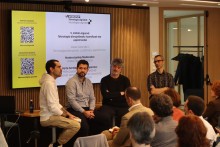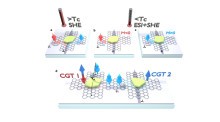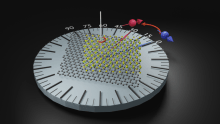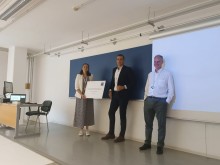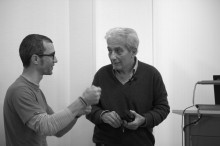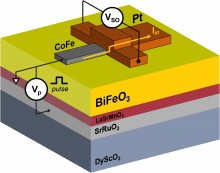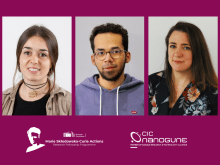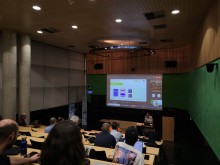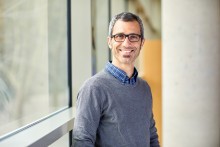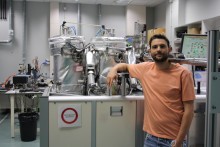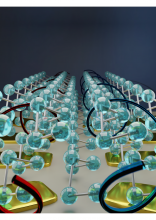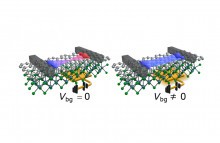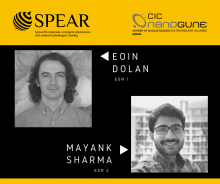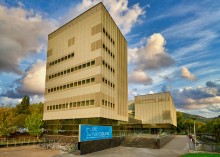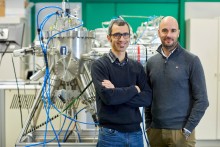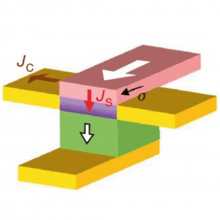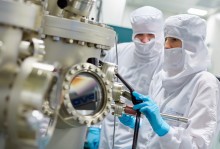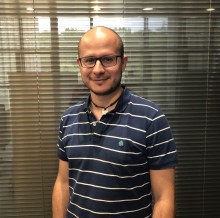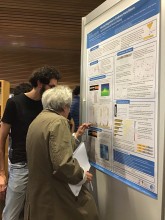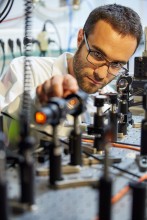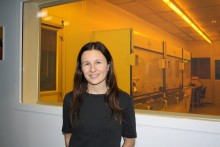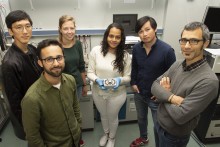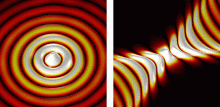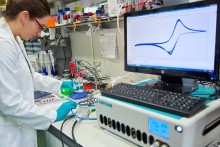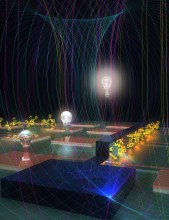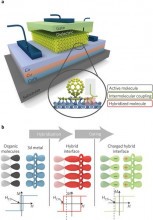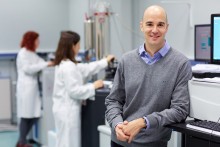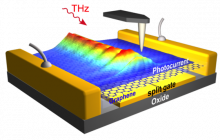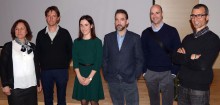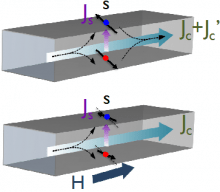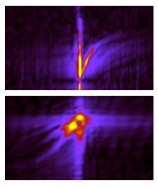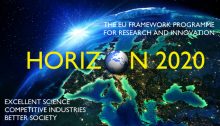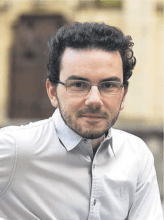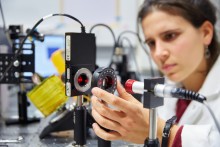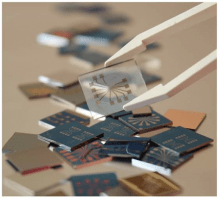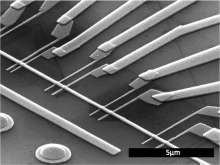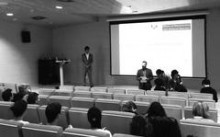Nanodevices News
Latest News
Beatriz Martín García receives one of the 2025 Journal of Materials Chemistry Lectureship runner-up awards
Breaking Ohm’s Law: Nonlinear Currents Emerge in Symmetry-Broken Materials
Sofia Ferreira Teixeira receives the Inspira Gazteak 2025 Award
Researcher Sofia Ferreira Teixeira has been honored with the Inspira Gazteak 2025 Award, presented by the Kutxa Foundation during a ceremony held yesterday at the TOPIC in Tolosa. This award recognizes young and committed talent in Gipuzkoa, celebrating individuals who contribute to building a fairer, more creative…
Donostia, the spintronics and orbitronics capital
Meeting on the digital future of Euskadi
The first-ever 2D spintronics device constructed entirely from proximitized structures
Researchers from CIC nanoGUNE, in collaboration with international partners, have achieved the first seamless 2D spintronics device made entirely from proximitized structures. They report a two-dimensional graphene spin valve that is enabled by proximity to the van der Waals magnet Cr2Ge2Te6. Published in Nature…
Unprecedented spin properties revealed in new artificial materials
María Barra receives the Nanolito award for her Doctoral Thesis
Transforming Digital Technologies through the SPEAR ITN project
Electrical control of magnetism by electric field and current-induced torques
In a recent review article published in Reviews of Modern Physics, Fèlix Casanova from the Nanodevices group at CIC nanoGUNE, Prof. Albert Fert, Nobel Prize in Physics, and his colleagues review the state of the art of electrical control of magnetism and give scientific and technological future persperctives.
The building block for magnetoelectric spin-orbit logic
In a recent article published in Nature Communications an international team, led by researchers from the Nanodevices group at CIC nanoGUNE, suceeded in voltage-based magnetization switching and reading of magnetoelectric spin-orbit nanodevices. This study constitutes aproof of principle of these nanodevices, which…
CIC nanoGUNE obtains three Marie-Sklodowska-Curie Individual Fellowship projects
The Cooperative Research Center nanoGUNE has achieved three Marie-Sklodowska Curie Individual Fellowship projects in the 2023 call, obtaining 624.071,52€ in total. The objective of this European programme is to support the education and the professional development of postdoctoral researchers by offering them a…
Nanodevices group hosts Interfast and Sinfonia project meetings
Fèlix Casanova receives the Intel Outstanding Researcher Award for the second time
Ikerbasque Research Professor Fèlix Casanova, co-leader of the Nanodevices group at nanoGUNE, has received the Intel Outstanding Researcher Award 2022 for his contributions to MESO technology, a technology that, ever since its inception, has taken the memory, interconnections and logic requirements of future…
CIC nanoGUNE joins the Basque Microelectronics Hub – BMH
Francesco Calavalle, winner of the GEFES award for best experimental thesis
The researcher Francesco Calavalle has been awarded the prize for best experimental PhD thesis by the Condensed Matter Physics Division (GEFES) of the Spanish Royal Physics Society (RSEF). The thesis “Probing and tuning the properties of van der Waals materials“ was worked on at CIC nanoGUNE, under the supervision…
Registration period for the summer internship program open
Magnet-free chiral nanowires for spintronic devices
Researchers from the Basque Nanoscience Research Center CIC nanoGUNE (San Sebastian, Spain), in collaboration with POLYMAT (San Sebastian, Spain), the Institute of Physics of the Martin Luther University Halle-Wittenberg and the Max Planck Institute of Microstructure Physics (both in Halle, Germany) demonstrate the…
Spin Control Without Magnetic Fields
Researchers from the Nanodevices Group at CIC nanoGUNE demonstrate that they can control the polarization direction of a spin current without having to apply a magnetic field, which could aid in implementing energy-efficient spintronics devices. The work has been published in Physical Review Letters.
NanoGUNE recruits two early-stage researchers (ESRs) for the SPEAR project
Fèlix Casanova receives the 2020 Intel Outstanding Researcher Award
CIC nanoGUNE receives 1.5 million euros from the European Commission
Three of CIC nanoGUNE’s research projects have been selected in the European FET Open (Future and Emerging Technologies) call. FET Open initiatives aim to strengthen major, high-risk, scientific and technical research projects carried out in collaboration. They are projects linked to the creation of new…
A project coordinated by CIC nanoGUNE receives nearly 4 million euros from the European Commission
CIC nanoGUNE is coordinating the SPEAR project, which seeks to explore new materials for the next generation of computer memories and processors; five European academic institutions (CEA-France, ETH Zürich-Switzerland, IMEC-Belgium, U. Hamburg-Germany, Martin Luther University Halle–Germany) and three European…
Low-power spin detection in non-magnetic systems
A team of researchers from Université Grenoble Alpes - CNRS - Spintec, Unité Mixte de Physique CNRS-Thales, and Université d'Evry, and also including Dr. Diogo. C Vaz, currently at CIC nanoGUNE, reports on an alternative strategy to achieve low-power spin detection in a non-magnetic system. The results have now…
CIC nanoGUNE and INTEL bring the MESO technology a step closer to reality
The Basque nanoscience research center CIC nanoGUNE and the multinational company Intel, the world’s largest manufacturer of integrated circuits, have been working hard in the last one and a half years in a disruptive technology for the electronics of the future: MESO technology. This technology integrates logic…
PhD thesis by Juan Manuel Gomez: Spin-transport in magnetic insulator/heavy metal heterostructures
Juan Manuel Gomez, Pre-doctoral Researcher at the Nanodevices group at nanoGUNE, received his PhD at the University of the Basque Country (UPV/EHU) after the defense of his thesis project at the beginning of 2020. His research work, entitled “Spin-transport in magnetic insulator/heavy metal heterostructures" …
nanoGUNE PhD Workshop 2020
nanoGUNE launches a new summer internship call for university students
Edurne Sagasta, winner of the GEFES 2019 Award for best experimental thesis
The researcher Edurne Sagasta has been awarded the prize for best experimental PhD thesis by the Condensed Matter Physics Division (GEFES) of the Spanish Royal Physics Society (RSEF). The thesis entitled Spin-to-charge current conversion in systems with spin-orbit coupling was worked on at CIC nanoGUNE.
Students from UPV / EHU, Tecnun, UAB and the UB carry out summer internships at CIC nanoGUNE
CIC nanoGUNE collaborates with Intel to open up the way for future computers
The Basque nanoscience research centre CIC nanoGUNE and the multinational company Intel, the world’s largest manufacturer of integrated circuits, are working together on a state-of-the-art project that seeks to develop what Intel refers to as the “MESO logic”: a new technology that combines memory, interconnections…
Apply for a Basque PhD grant with nanoGUNE
NanoGUNE, located at the Ibaeta Campus of the UPV/EHU in Donostia – San Sebastián, offers PhD opportunities to graduates in Physics, Chemistry, Engineering, Biology, and related areas to get their PhD degree.
Basque researchers turn light upside down
Researchers from CIC nanoGUNE (San Sebastian, Spain), in collaboration with the Donostia International Physics Center (DIPC, San Sebastian, Spain) and Kansas State University (USA), report in Science the development of a so called 'hyperbolic metasurface' on which light propagates with completely reshaped…
CIC nanoGUNE is participating in two European projects to train young researchers
NanoGUNE is set to participate in two new projects on quantum electronics and hybrid coatings in one of Europe’s most competitive programs, the European Union’s Initial Training Networks (ITN), starting January 2018. Through this participation the center will be receiving nearly half a million euros for each…
Magnetic electrodes increase solar cell efficiency
Molecular spintronics in Nature Materials
Materials for second-generation information and communication technology applications should be as small and as fast as possible. It is precisely these kind of materials that Ikerbasque Prof. Luis Hueso, head of the Nanodevices Group at nanoGUNE is seeking for, together with his colleagues Mirko Cinchetti (TU…
ERC Proof of Concept for Luis Hueso
CIC nanoGUNE’s Nanodevices Group receives a grant of 150,000 euros from the European Commission through the ERC Proof of Concept program, which aims to put into practice the innovative potential of the ideas generated in cutting-edge research projects funded by the European Research Council (ERC). The FAST TestOM…
Summer Internship Program: call open until 5 February
On-chip observation of THz graphene plasmons
Researchers developed a technique for imaging THz photocurrents with nanoscale resolution, and applied it to visualize strongly compressed THz waves (plasmons) in a graphene photodetector. The extremely short wavelengths and highly concentrated fields of these plasmons open new venues for the development of…
Coexistence of superconductivity and charge density waves observed
Scientists at Max Planck Institute for Solid State Research, BESSY II Synchrotron and nanoGUNE have discovered that an artificial structure composed of alternating layers of ferromagnetic and superconducting materials induce Charge Density Waves deeply into the superconducting regions, indicating new ways to…
Spin injection in two-dimensional layered materials, PhD thesis by Oihana Txoperena
Oihana Txoperena, Pre-doctoral Researcher at the Nanodevices Group at CIC nanoGUNE, received her PhD at the University of the Basque Country (UPV/EHU) after the defense of her thesis project on 8th April 2016. Her research work, entitled “Spin injection in two-dimensional layered materials", has been developed…
A new magnetoresistance effect occurring in materials with strong spin-orbit coupling
Researchers of the Nanodevices group, in collaboration with groups from the CFM and DIPC, both institutions also located in Donostia-San Sebastián, have discovered a new magnetoresistance effect occurring in materials with strong spin-orbit coupling. This new effect has been recently reported in the prestigious…
Tracking slow nanolight in natural hyperbolic metamaterial slabs
Researchers from the Nanooptics and the Nanodevices groups at CIC nanoGUNE (Basque Country) in collaboration with colleagues at ICFO - The Institute of Photonic Sciences (Catalunya) have imaged how light moves inside an exotic class of matter known as hyperbolic materials. They observed, for the first time,…
The Nanodevices group participates in the 2D-INK Fet Open project
The 2D-INK project, led by the Molecular and Supramolecular Materials group of POLYMAT-UPV/EHU, has been funded by the European Union with 2,962,661 €. The projects aims at developing inks of novel 2D semiconducting materials -needed for the functioning of electronic devices- for low-cost large-area fabrication…
Charge and spin transport in graphene devices, PhD Thesis by Luca Pietrobon
Luca Pietrobon, Pre-doctoral Researcher at the Nanodevices Group at nanoGUNE, receives his PhD at the University of the Basque Country (UPV/EHU) after the defense of his thesis project on Friday 5 June 2015. His research work, entitled “Charge and spin transport in graphene devices", has been developed under…
nanoGUNE Scholarship: call for Master Thesis students
The researcher Estitxu Villamor got a special mention in the CAF-Elhuyar awards
Estitxu Villamor, who has developed her PhD thesis in the Nanodevices group at CIC nanoGUNE, received the special mention certificate in the CAF-Elhuyar Awards. These awards are designed to promote, reward and recognize popularization, journalism and the integrating into society of subjects and research relating to…
“Nanostructuring of Devices for Nanoscience Applications”, PhD Thesis by Libe Arzubiaga
Libe Arzubiaga, Pre-doctoral Researcher at the Nanodevices Group at nanoGUNE, receives her PhD at the University of the Basque Country (UPV/EHU) after the defense of her thesis project on Monday 16 March 2015. Her research work, entitled “Nanostructuring of Devices for Nanoscience Applications”, has been developed…
Marco Gobi, Best Experimental Thesis Award
Marco Gobbi has been awarded the Best Experimental Thesis Prize by GEFES, Group Specialized on Solid State Physics of the Spanish Royal Physical Society. Dr. Gobbi is a former pre-doctoral researcher at the Nanodevices Group of nanoGUNE, where he presented the PhD thesis “Spintronic Devices Based On Fullerene C60”…
"Injection, Transport, and Manipulation of Pure Spin Currents in Metallic Lateral Spin Valves", PhD Thesis by Estitxu Villamor Lomas
Estitxu Villamor, Pre-doctoral Researcher at the Nanodevices Group at nanoGUNE, receives her PhD at the University of the Basque Country (UPV/EHU) after the defense of her thesis project on Monday 15 December 2014. Her research work, entitled “Injection, Transport, and Manipulation of Pure Spin Currents in Metallic…
Science: Flatland optics with graphene
Researchers from nanoGUNE, in collaboration with ICFO and Graphenea, introduce a platform technology based on optical antennas for trapping and controlling light with the one-atom-thick material graphene. The experiments show that the dramatically squeezed graphene-guided light can be focused and bent, following…
"Polythiophene-based nanoscale lateral devices", PhD thesis by Thales V. A. G. de Oliveira
Thales de Oliveira, Pre-doctoral Researcher at the Self-Assembly Group at nanoGUNE, received his PhD at the University of the Basque Country (UPV/EHU) after the defense of his thesis project on Friday 23 May 2014. His research work, entitled “Polythiophene-based nanoscale lateral devices”, has been developed under…
"Resistive switching in Hafnium oxide", PhD thesis by Raul Zazpe
Raul Zazpe, Pre-doctoral Researcher at the Nanodevices Group at nanoGUNE, received his PhD at the University of the Basque Country (UPV/EHU) after the defense of his thesis project on Wednesday 30 April 2014. His research work, entitled “Resistive switching in Hafnium oxide”, has been developed under the…
“Spintronic devices based on fullerene C60”, PhD Thesis defended by Marco Gobbi
Marco Gobbi, Pre-doctoral researcher at the Nanodevices Group, got his Doctor Degree at the University of The Basque Country (UPV/EHU) after the defense of his thesis project on Friday 24 May 2013. His research work achieved the maximum qualification (cum laude) after the defense and assessment of his work by an…
New technology in the magnetic cooling of chips
A team of CIC nanoGUNE researchers has participated in the development of a new technology that will enable the environmental impact to be minimized. The work has been published in the prestigious journal Nature Materials.
First year HINTS
NanoGUNE’s Nanodevices Group participates in HINTS, a European project that aims at advancing Spintronics by developing new hybrid organic-inorganic (HOI) materials featuring strong and tuneable spin-transfer efficiency at the interfaces.
Nature Communications: Resolving the electromagnetic mechanism of surface-enhanced light scattering at single hot spots
In a recent article (P. Alonso-González, et al., Nat. Commun. 3, 684) researchers from the nanooptics and the nanodevices groups at nanoGUNE provide experimental evidence that the intensity elastically scattered off the object scales with the fourth power of the local field enhancement provided by the antenna, and…
NanoGUNE awarded in the Raith Micrograph Award 2011
The micrograph of a lateral spin valve with integrated dielectric mask, which was obtained by the Ph.D. student Thales de Oliveira from the Self-Assembly Group, has been awarded the second prize of the Raith Micrograph Award 2011. Raith is one of the world-leading suppliers of innovative solutions for…
Nature Photonics: Transmission Lines for Nanofocusing of Infrared Light
A joint cooperation between three research groups at nanoGUNE reports an innovative method to focus infrared light with tapered transmission lines to nanometer-size dimensions. This device could trigger the development of novel chemical and biological sensing tools, including ultra-small infrared spectrometers and…
Nanodevices Group in Nature Physics
Luis Hueso, leader of the nanodevies group at nanoGUNE, has collaborated in a research project on organic spintronics led by CNRS/Thales. The most recent results of this collaboration have been published in Nature Physics in June 2010 in the article Unravelling the role of the interface for spin injection into…
Nanodevices Group in Nature Materials
The progress article Spin routes in organic semiconductors written by Luis E. Hueso, leader of the CIC5 nanodevices group in nanoGUNE, together with V. Alek Dediu, Ilaria Bergenti & Carlo Taliani from the Institute for Nanostrucured Materials-CNR (Bologna, Italy), was published in Nature Materials on August…
Agenda
| Mon | Tue | Wed | Thu | Fri | Sat | Sun |
|---|---|---|---|---|---|---|
|
26
|
27
|
28
|
29
|
30
|
31
|
1
|
|
|
|
|
|
|
|
|
|
2
|
3
|
7
|
8
|
|||
|
|
|
|
|
|||
|
9
|
10
|
11
|
12
|
13
|
14
|
15
|
|
|
|
|
|
|
|
|
|
16
|
17
|
18
|
19
|
21
|
22
|
|
|
|
|
|
|
|
|
|
|
23
|
24
|
25
|
26
|
27
|
28
|
1
|
|
|
|
|
|
|
|
|


